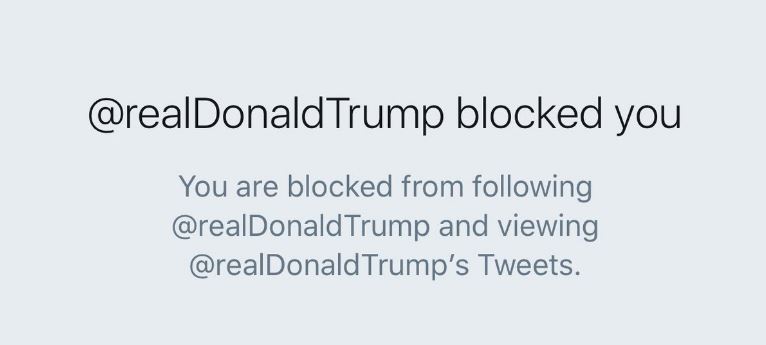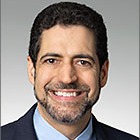Blocking Twitter Users from the Presidential Account
President Trump’s alleged blocking of members of the public on Twitter on what appear to be viewpoint-based considerations, preventing them from reading his tweets and responding to them, raises serious constitutional issues.

Published by The Lawfare Institute
in Cooperation With

President Trump’s alleged blocking of members of the public on Twitter on what appear to be viewpoint-based considerations, preventing them from reading his tweets and responding to them, raises serious constitutional issues.
The Supreme Court has recognized that special free speech rights apply in areas such as streets and parks, which the Court has said have been “immemorially been held in trust for the use of the public and, time out of mind, have been used for purposes of assembly.” As a social media platform, Twitter is not a street or a park, nor is it a government property. And no one can claim that the ability to see Twitter posts or reply to them are speech areas that have been “immemorially been held in trust” for speech and assembly. The First Amendment principles of free speech are broad and overarching, however, and must be honored in the context of the internet, even if tweets and websites were never contemplated by our constitutional framers. Where the government opens up a new type of forum for speech, whether on government property or on the internet, the same constitutional protection applies as that extended to expression in a traditional public forum.
The President has not, of course, formally designated the @realDonaldTrump Twitter account as a public forum. The President, however, uses his @realDonaldTrump account to speak to matters as President of the United States. He speaks to acts of foreign countries, court decisions, legislative proposals, posts video of cabinet meetings, and expresses his views as President on a host of public policy issues. Given how the account is used, it is clear that Mr. Trump is writing in his official capacity as President of the United States; this is not merely a personal social media account where Mr. Trump posts birthday greetings to friends and family. And if there were any doubt about the nature of this account and how it is used by the President, his own spokesperson put that doubt to rest when has said, without qualification, that the posts of the President on @realDonaldTrump should be “considered official statements by the President of the United States.” Notably, the U.S. Court of Appeals for the Ninth Circuit quoted that White House Press Secretary statement in its recent “Travel Ban” opinion.
That the President speaks in a particular forum does not by itself open up a right to respond in the same forum. For example, that the President posts press releases or other official statements on the White House website, does not open up the right of public to respond on that website. If, however, the government opened a comment forum on its website, that comment section might be considered a designated forum for speech. If so, regulation or restrictions on the rights of the public to post comments could be subject to strict scrutiny (where to enforce a content-based exclusion the government must show that its regulation is necessary to serve a compelling state interest and that it is narrowly drawn to achieve that end). Or that hypothetical comment forum might be considered a limited public forum, where content regulations are allowed if they are "reasonable and viewpoint-neutral." As the Supreme Court wrote in Lamb's Chapel v. Center Moriches Union Free School District,"[C]ontrol over access to a nonpublic forum can be based on subject matter and speaker identity so long as the distinctions drawn are reasonable in light of the purpose served by the forum and are viewpoint neutral.”
In either case, the government may not suppress expression merely because it opposes the speaker's point of view. As the Supreme Court has explained: “It is axiomatic that the government may not regulate speech based on its substantive content or the message it conveys.” Therefore, “[v]iewpoint discrimination is thus an egregious form of content discrimination. The government must abstain from regulating speech when the specific motivating ideology or the opinion or perspective of the speaker is the rationale for the restriction.”
Here, instead of a government website comment forum, the President is using the social media platform Twitter as a place to issue “official statements by the President of the United States” and permit comments thereto. Bloomberg BusinessWeek estimated that there are some 20,000 replies posted to a typical presidential tweet on the @realDonaldTrump. Thus, there is a thriving public forum or replies and counter responses on the speech platform employed by the President. And as Buzzfeed recently reported, the top replies to a @realDonaldTrump tweet are virtually guaranteed to get in front of hundreds of thousands of eyes. So, denial of the right to reply in this forum can be viewed as a significant impairment of a citizen’s speech rights.
For the President to generally permit tens of thousands of comments on his posts on the @realDonaldTrump forum, but then selectively ban citizens from posting replies to his president’s posts based upon the content, message or viewpoint of the citizen appears to be clearly contrary to established First Amendment principles. Yet, that is reportedly how the President is operating his Twitter account. For example, the Veteran advocacy group VoteVets, which represents (according to its website) more than 500,000 veterans, reports that it was blocked by the President after it criticized the President and his policies:
The Commander in Chief can block @VoteVets, the voice of 500k military veterans and families, but we will NOT be silenced. pic.twitter.com/SaCN5hKU9R
— VoteVets (@votevets) June 13, 2017
Notably, as the blocking–notice above indicates, the blocked party is not only barred from speaking on the @realDonaldTrump reply comment forum, but is also barred from viewing the tweets posted by the President. That is remarkable. The President cannot issue public official statements as the Chief Executive, and then seek to bar those who disagree with him from even accessing them. A city could not restrict access to its library based on a person’s political party affiliation, viewpoint, or religion. Likewise, the President cannot try to block access to his official Presidential statements on Twitter, by blocking citizen based on their viewpoints or political leanings.
Blocking a Twitter account does not make it impossible for the blocked party to access the tweets of the President, but it does make it more difficult. The user would access Twitter while logged out or through a different account. This obviously creates a punitive barrier to viewing the presidential tweets, based upon the viewpoint of the account holder. Again, this appears to be a clear First Amendment violation.
Last week, the Knight First Amendment Institute at Columbia University sent the President a letter objecting to his blocking two specific users from viewing and replying to his @realDonaldTrump posts, and asserting that his doing so violates the First Amendment.
If the President and his subordinates (if involved with monitoring or blocking the objectionable commenters) do not change course on his blocking of citizens, based on viewpoint, from viewing and replying to his official statements posted on the @realDonaldTrump Twitter account, there will no doubt be injunctive actions brought to compel compliance with the First Amendment. And the President’s subordinates (who lack absolute immunity to damage actions possessed by the President) involved in the blocking of objectionable commenters may be subject to Bivens damage actions for violating the First Amendment right of U.S. Citizens.
The President will no doubt rail against the Court when they uphold the First Amendment and order him to stop this unconstitutional practice. But this is an example of yet another unforced error by the President, which can and should be self-corrected. There ought to be no need for litigation.



.png?sfvrsn=48e6afb0_5)

